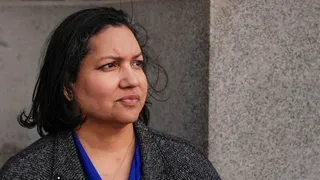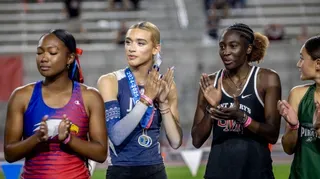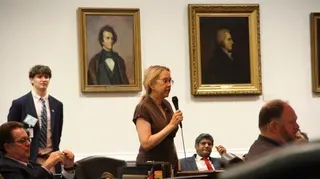April 9, 2012
Victim of Georgia Ave. Robbery Speaks
Chris Sosa READ TIME: 8 MIN.
Following the March 12 beating and subsequent robbery of a gay man by two separate groups of people in the city's Park View neighborhood, Washington's LGBT community sprang into action.
The victim says he was dropped off by a cab at the corner of Georgia Avenue and Irving Street NW at 9:30 p.m. that evening. He began to walk down the street when he was attacked by a group shouting homophobic slurs, who beat and kicked him. After the attack, he called his partner on his cell phone to come help him, but was set upon by another group who robbed him of his iPod, iPad, keys, two credit cards and a debit card.
The suspects fled before police arrived. After flagging down a police car, the victim was transported to the George Washington University Hospital for treatment. He suffered two separate jaw fractures in the attack, and had to be intubated - placed on a breathing tube - until the swelling in his jaw subsided, just so he would be able to have several surgeries to fix his broken jaw.
Metropolitan Police have categorized the crime as a robbery using force and violence, with a potential bias motivation.
Motivated by the savagery of the attacks on this man, as well as a string of other violent attacks on members of the LGBT community, including other assaults and a shooting at an IHOP restaurant, people held a march to protest the violence and call for police accountability in investigating and pursuing suspects in what are believed to be hate crimes.
With the announcement of an arrest of the suspect in the nearby IHOP shooting on March 26, news media turned their focus towards the victim of the Georgia Avenue attacks. He and his partner, who arrived on scene minutes after the two attacks occurred, agreed to sit down for an interview with Metro Weekly to share their side of the story, on the condition that their names not be used. They hope that telling their story will encourage possible witnesses or other people with information to come forward and notify police, in hopes of arresting those responsible for the attacks.
METRO WEEKLY: Let's go back to when this all happened. So, what was your state of mind when you were coming home? You got dropped off about two blocks from your house...
VICTIM: Not even a block.
MW: Why didn't you just get dropped off in front of the house?
V: Well, I was out with a friend earlier, and we played the ''let's see if he can get a cab first,'' and so, he was on one side, I was on the other, and he got a cab for me. So, he knows I live here, but he doesn't know my exact address. He just told the cabbie, ''Georgia and Irving.''
And so we came up on Georgia, and I figured it was senseless to make a right on Irving for him to just turn around and come back. It was a nice night out. It was only 9, 9:30, so I figured, ''I can walk the block home.'' I mean, I do this walk home all the time.
I made it to about the back alleyway, which is behind the 77 Market, which is on the corner, and that's when the first attack happened.
All I can say is that was motivated - as just an attack. There was no intent to steal anything. There was no...they didn't steal my phone, they didn't steal my iPad. They were just looking for a fight, it looked like.
I just remember having my bag wrapped around me, I remember being dragged, I remember being assaulted. They were just calling me ''faggot white boy,'' and [I remember] just bracing myself for the kicks that ensued. I don't know if they decided they did their damage, and did what they did.
The next thing I remember is I just want to be able to call [my partner] and let him know what happened. And so, I was on the phone with [him] when the second attack occurred. I think they're different attacks, because the second attack, they did steal the iPhone, they stole the iPad.... I was fortunate they didn't steal my wallet, because that was in my pants pocket and not in my messenger bag.
MW: When you said you were dragged, how far were you dragged? Do you remember?
V: Into the alley on this side of the street (points toward opposite side of Irving Street).
PARTNER: That side.
V: I think it was just a short drag to get me away from view of anyone walking down the street.
MW: Was anybody on the street at that time?
V: There were plenty of people on the street.
MW: Do you know if anybody saw you?
V: I'm almost certain there had to be someone that did. When [my partner] came to look for me, he told me how there were just people all over the street, walking their dogs....
P: Lots of cars, lots of people, up at Georgia and Irving, all four sidewalks.
MW: So walk me through. Did they come from behind you? Did you see them out of the corner of your eye?
V: I want to say that I saw them when I was walking down the alley, but there's always people at that corner market. So I just leave them be, I don't bother them. But I don't remember hearing footsteps or anyone coming behind me. But they definitely came from behind for the attack.
MW: What injuries did you have at that point when you called?
V: I couldn't tell you. It could have been from the first attack that I suffered my first break, or I could have had both breaks, I honestly don't know.
MW: (To Partner) And when you received the call, what was your first instinct?
P: I knew he was on the way home, and when he called, I assumed he was in the neighborhood or something. But he said immediately that he had been mugged, or attacked, or something. He did say he had been hit in the jaw. And then, at some point, I heard someone say, ''We're with the police, turn around,'' and I heard [him] say, ''You're not with the police.'' And then I hear a struggle starting, the phone hit the ground, and then, about a minute or so later, I heard a female voice walking towards the phone, pick up the phone and turn it off.
MW: Do you know if the first group had any females in it?
V: I don't recall a female in the first group.
MW: Once the second attack happened, were you conscious at that point?
V: Yeah, at that time, I was weaving in and out of traffic, trying to stop traffic, and I ended up flagging down a cop car.
MW: What did the cop do when you flagged him down?
V: Pretty much, just sat me down, started taking pictures, and calling the ambulance.
MW: When was it determined that you had the jaw fractures?
V: The jaw fracture was obvious.
P: They were talking about that before he even got [to the hospital].
V: But because of the injuries, and everything I sustained, I couldn't immediately go into surgery, because I had to be intubated because of the swelling. I ended up spending two days in ICU before they could even do any surgeries.
MW: Have you ever had problems like this before, or have you heard of neighbors who have had problems like this?
V: I read up on the neighborhood. ... I have heard of other people being attacked in the neighborhood, but not nearly to this extent. It hasn't been this bad. Not just too long ago someone was held up at gunpoint at Warder [Street].
MW: What do you think is the motivation behind these? Are these crimes of opportunity?
V: The second was a crime of opportunity for sure. I have nothing that I could say about the first attack, other than...I feel like I may have been wrong place, wrong time, and I think I may have just been singled out for appearing to be gay.
MW: When you first hear about the march?
V: I think it was either the day before I was released, or one more day before that. I was amazed. It was very reassuring, and it made me glad to be part of the community I belong to. I was just amazed by the support of my friends, because it was some very close friends who organized that march.
MW: When we talk about hate crimes, or crimes with bias enhancements, do you think the Metropolitan Police Department has been doing a good job?
V: Before this, I always thought there was sort of a blind eye turned towards it. Hopefully, that's not the case, because I have been working with a detective. There's not much for them to work with, but I feel like they've been investing a good deal of energy and time with me, and trying to get this taken care of.
MW: Why do you think there would be hostility, or why do you think you would be singled out in this neighborhood?
V: Because this neighborhood is still, for lack of a better word, gentrifying, I guess. So I think that would be one of the reasons I would stand out, because I'm new to the neighborhood.
MW: Has there been hostility expressed by anyone in the neighborhood, older residents?
V: No.
MW: If they were to find the people who attacked you, would you be willing to testify? Would you be scared to testify?
V: The only problem I have is I don't visually remember the people, so it would be hard for me to testify.
MW: (To Partner) What's your take on this? Seeing your partner hurt, then seeing the outpouring of support, yet also having this frustration because there aren't a lot of facts for the police to go on?
P: It's not frustrating with the police, but just frustrating in general that there's not a lot of information to go on. As we were saying before, there were so many people around, I feel like there's definitely someone, or several people, who saw what happened, and just haven't come forward.
MW: Why do you think people would not want to come forward?
P: Just fear, I assume. Or some of them don't care. I don't know. I can't speculate on that.
We assume the criminals are someone who hangs out in the neighborhood, or who is here often, so perhaps people don't want to say anything because of that.
MW: Do you think there's an underlying racial animus?
V: Not really.
MW: If you could do something differently, what would you do?
V: I would have taken the cab all the way home.
MW: What's your advice to other people, to avoid this?
P: We're generally pretty cognizant of what's going on around us, so that's certainly some advice I would give anybody. But, you know, it was 9 o'clock on a Monday night. Typically, we haven't had any problems, or had any fear, at that time of day or week. You know, we go to the grocery store and walk back at that time of night. So I'm surprised. 2 o'clock in the morning you might expect something like that to happen, but...
MW: What's your take on the other people in the neighborhood? Have they reached out to you since the march?
P: Yeah, we know some of the neighbors who have called and sent cards, and the neighborhood sort of ''crew'' sent some flowers as well. They've been very supportive.






